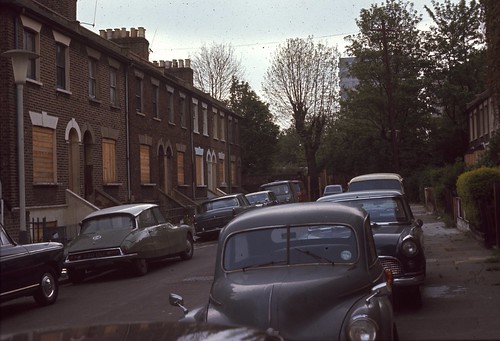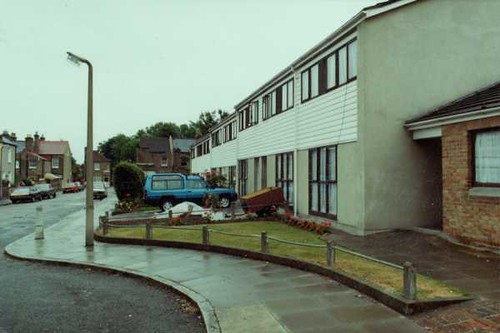
Deptford High Street

South Acton awaiting redevelopment 1971
People have been discussing the BBC programme "Destruction by design", which talks about the fate of old working class Deptford at the hands of Lewisham Council's redevelopment machine. I worked for Lewisham Council from 1978 but the damage had been done by then. I am not able to view the programme but I assume the surviving street was Albury Street. This was exceptional as the houses dated from 1710 and of the highest quality.
I came in halfway through the redevelopment performance when I began training as a planner in 1965. Planners were taught to do the sort of thing that was described in the programme - design destructive redevelopment schemes with relief roads. It was a standard examination project for membership of the Town Planning Institute.
In 1964 I went to day release planning courses at Brixton and Hammersmith Schools of Building, now part of South Bank and Thames Universities. There was a revolt amongst the students who questioned what they were being asked to do. That was probably the start of the reaction against urban redevelopment. I then studied landscape design at Newcastle between 1967 and 69. Those of us on the course who thought about the matter at all were more than uneasy about what was going on, not least because we were living in the middle of a Victorian area of the city which was being literally knocked down all around us.
My first job after that, in 1969 was at the London Borough of Ealing, which was then busily knocking down a good quality early Victorian area in South Acton, which turned into an instant slum as soon as it was finished. I did not get on with my colleagues who thought they were doing a wonderful job. It was two years of conflict.
My second job was at the London Borough of Haringey, which was following much the same policy, producing schemes such as the notorious Broadwater Farm - though the latter involved no redevelopment. A few colleagues there were more dubious about the policy and were thinking about the concept of infill ie demolishing pockets of housing that were in poor condition and replacing them with new terrace houses. I designed a house type which could be used as "matching infill", based on the same Victorian house plan. This was very difficult but not impossible, due to modern building regulations and car parking standards, but could have been achieved.

Infill redevelopment in Tottenham, 1975
At the same time I was living in Stoke Newington where Hackney Council was following the same policy of "rolling redevelopment", the aim being to bring the borough's entire housing stock into council ownership. They picked a bad target, the Mapledene area of Dalston, where local residents were sufficiently articulate to oppose what the council was planning. They fought back, marshalled a counter-attack and at the public enquiry, they demolished the council's feeble arguments for redevelopment. This was in 1973, and it was the landmark case which put a stop to the kind of thing that was happening in Deptford.

Hackney old and new 1970
My final job, at Lewisham began in 1978, when the council put in hand a programme to clear up the mess left-over from the redevelopment programme. But the effects of the misguided policies live on.
Kommentarer